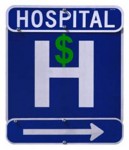Subscribe if you want to be notified of new blog posts. You will receive an email confirming your subscription.
Is HITECH Working? #1: Hospitals are grumbling but are playing in the game; success is not guaranteed.

by Vince Kuraitis JD, MBA and David C. Kibbe MD, MBA
The rationale for hospitals having to play in the HITECH game is straightforward: the financial carrots through 2015 are helpful, and the financial sticks after 2015 will be very painful.
We’ll discuss:
- Financial Impacts on Hospitals
- Survey Data Showing Hospitals Will Play
- Why Success is Not Guaranteed
Financial Impacts on Hospitals
Even prior to HITECH, most hospital executives already had passed the threshold decision and concluded that they need to implement EHR technology. Thus, the issue for most hospitals isn’t “whether” to implement EHR technology, but “when”, “at what cost”, and “how”.
CCHIT estimated the cumulative financial incentives (carrots) available for a typical 500 bed hospital. They concluded the upside revenues could be up to $5 million (see slide 29); we believe CCHIT’s estimate is extremely conservative.
A MedeAnalytics study, Meaningful Use: The Economic Sticks, examined the impact of penalties (sticks) starting in 2015 for non-adopters:
Since Medicare accounts for a large share of most hospitals revenues, the adjustments to the market basket update to the IPPS constitute a major financial downside risk for hospitals, potentially, given the volatility and often marginal level of hospital profits in recent years, determining whether a hospital finishes a year in the black or in the red.
The CEO or CFO are likely to look at both the carrots and sticks as “dollars added to (or taken away) from our bottom line”.
Survey Data Showing Hospitals Will Play
Here’s some of the more persuasive surveys of hospitals executives that we’ve seen:
Healthcare IT Webinar reporting on Porter Research/Billian’s HealthData Hospital Survey, February 2010
- Will your organization pursue funding made available through the HITECH Act?
- Yes — 76%
- No — 6.5%
- Unsure — 17.5%
- To what extent do you agree with the following statement: I believe the HITECH Act will…Promote the adoption of EHR technology in the hospital market? Yes — 90.3%
2010 HIMSS CIO Leadership Survey, March 2010
- Top IT priority for next two years
- Meeting meaningful use criteria — 42%
- Focus on clinical systems — 27%
Why Success is Not Guaranteed
Patty Endrado, Special Projects Editor for HealthcareIT News, summarized hospital concerns:
In a model letter to member hospitals, the American Hospital Association provided a specific list of concerns and urged members to submit formal comments on the HITECH NPRM on Meaningful Use:
-
The proposed overall design of the incentive programs;
-
The burden of reporting under the proposed rule;
-
The definition of certification and the absence of a proposed certification process;
-
The definition of a hospital-based eligible professional;
-
The definition of a “hospital” for the Medicare program;
-
Several aspects of the Medicaid incentive program;
-
Operational concerns; and
-
The proposed approach to privacy and security.
Hospitals describe major gaps in preparedness to meet meaningful use criteria. Writing in healthsystemCIO, Mark Holland quoted a recent Computer Sciences Survey of 58 hospitals:
Two-thirds of the hospitals have identified gaps in their current EMR systems that inhibit their ability to meet meaningful use requirements; only one-quarter have met at least 70% of the readiness criteria.
Hospitals also are concerned about their ability to achieve meaningful use. In responding to a recent CHIME Survey, 88% of participants gave responses ranging from “a little worried” to “worried”.
Our point here isn’t to evaluate whether the bar actually is set too high or appropriately for hospitals. While that’s a very important question, it’s different than the one we’re primarily addressing is this series of essays.
To sum up: hospitals must play in the HITECH game — the financial carrots and sticks are significant…but they come to the game grumbling loudly…and have significant concerns about whether they can play successfully.
This work is licensed under a Creative Commons Attribution-Share Alike 3.0 Unported License. Feel free to republish this post with attribution.
Next in our series "Is HITECH Working? Hospitals are grumbling but are playing in the game…" http://bit.ly/9pBkXU #healthit #ehr
I wish some of these surveys would segregate responses by type of hospital.
I bet rural and other small hospitals will have very different survey numbers. If we’re not careful, HITECH could exacerbate already existing disparities between the big hospitals and the barely surviving little ones.
Margalit, of course you’re right.
We’re trying to make some broad, cross-industry generalizations about whether HITECH is working.
The effect of HITECH will not be equal across all hospitals. Rural, inner-city, and others will be disadvantaged. Thanks for the added granularity of your perspective.
Is HITECH Working? #1: Hospitals are grumbling but are playing in the game; success is not guaranteed. | e-CareManagement http://ow.ly/1yBgj